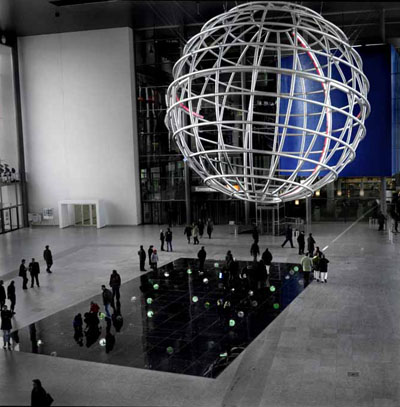INGO GUNTHER
PEOPLEText: Eriko Nakagawa
Mr. Ingo Gunther is an artist who is famous for his journalistic oriented project. He visited Obihiro (located in Hokkaido, Japan) to give a lecture. He is one of the invited artists for ‘Tokachi international modern art festival Demeter‘. This big event will be held from 13th July to 23rd September 2002 next year. The main site is Obihiro horse race track and it is a sight specific installation.

Exosphere Installation. Wolfsburg, 2000.
You are multi talented: you are a journalist, an author and an artist. What does ‘Art’ mean to you?
Art, of course, means everything, or different things to different people. When I started I had a different idea of arts and a different ambition in art. I tried to see how art can exist and function in-between other disciplines.
For instance, you have journalism, medicine, geography, or politics. Every field is clearly defined. You can study those fields in great detail. But in-between, there is really nothing much that connects the fields. If you want to work and improve any of those fields you would have to go through the process of their hierarchy – but in art it is different. There is no hierarchy. You don’t even start at A arrive at Z but you start almost anywhere and end up somewhere… It’s not that clear. I saw an opportunity to be the interface between other disciplines. That would be an important role. That is where I saw a very useful position for art.
Another one is that art in a very strange way is making sense out of things. Sometimes if you have a disaster on one level, you might turn that into success. It’s almost like an adventure. If you succeed or not, that does not have anything to do with you really reaching your goal. You may reach something else but then you have to understand if it is useful or not. And it’s all about trying to apply what you have learned in that process.
Art in that sense creates an unconditional space. That has to do with the idea of artistic license or artistic freedom. It’s a great possibility – I think only art offers that. Other disciplines don’t really have that liberty.
You often use journalistic themes like environmental problems, politics, economics, military issues and so on, what made you to attempt to deal with these themes as art?
Sometimes I have the ambition to be a journalist. I see a real world problem not only as an aesthetic problem. It’s a real problem, which requires real-word solutions. So what is the journalist doing? The journalist investigates it and writes about it. Then ideally the process is that the public becomes aware of it. Politicians representing the public then would take some action.
That is the basic and simple idea, political prosses for progress… making things work. But for me, that process is sometimes a bit too long and it doesn’t always work. That’s kind of frustrating thing for me. If I reported something, I want to find out; Why is that so? Why can’t it be different? What keeps us from changing this?
So when I was reporting about refugees, I found that it becomes ridiculous to just write about refugees because the story will be always the same: “Oh poor refugees”. Readers will understand “Ah refugees, that is a tough problem.” and they will shrug it off with a sort of ‘shoganei’ attitude – “next story, please.”
It leaves people with a kind of sad feeling. But that’s neither good for refugees nor the readers – it’s not good for anybody. This is a dead end of journalism. Morally it’s quite ok but practically it is useless. I decided that I should not write about the problem unless I have a very good understanding and can make some suggestions what can be done.
But that goes against the rules of journalism. So what I have to do is to create my own system. I try to for instance with using the globes as my format. I am using the globe format to understand the context and also to provide global background dimension and proportion to local, national or regional issues. It has become also an interface to understand the totality of global reality intuitively and quickly.
And the other thing is to come up with some kind of solutions, maybe even playfully… I want people to be willing to entertain some ideas, to think about ideas without thinking “Oh my God, what a huge depressing problem.” I like the audience to get engaged in this issue without being put off and beyond voyeurism. The message in journalism is so often quite clear. When you read about war, the message is never ” Wow – War is great!”, you know. That’s not really the story. Nobody will write it. Nobody can write it. The story will always be how terrible war is. And that message is an old one. I question the necessity to repeat that over and over again. The story should rather be how we can prevent it and what lead to the disaster in the first place. That’s my idea of journalism, which is very much not journalism. Maybe too much activism … But it comes from journalism sometimes. That is where my motivation comes from.
Read more ...




